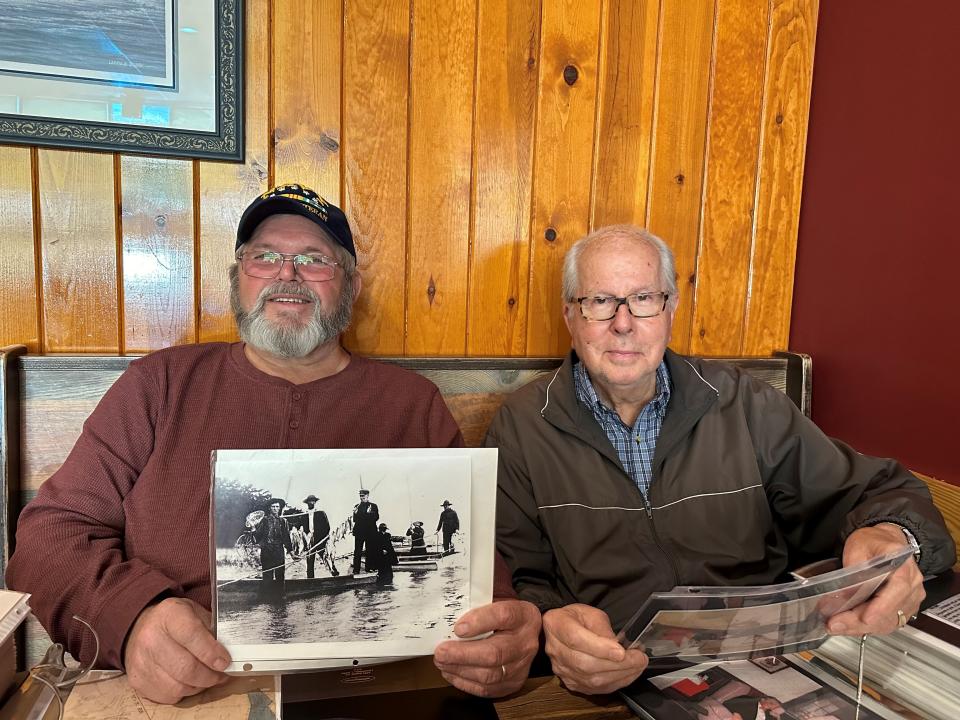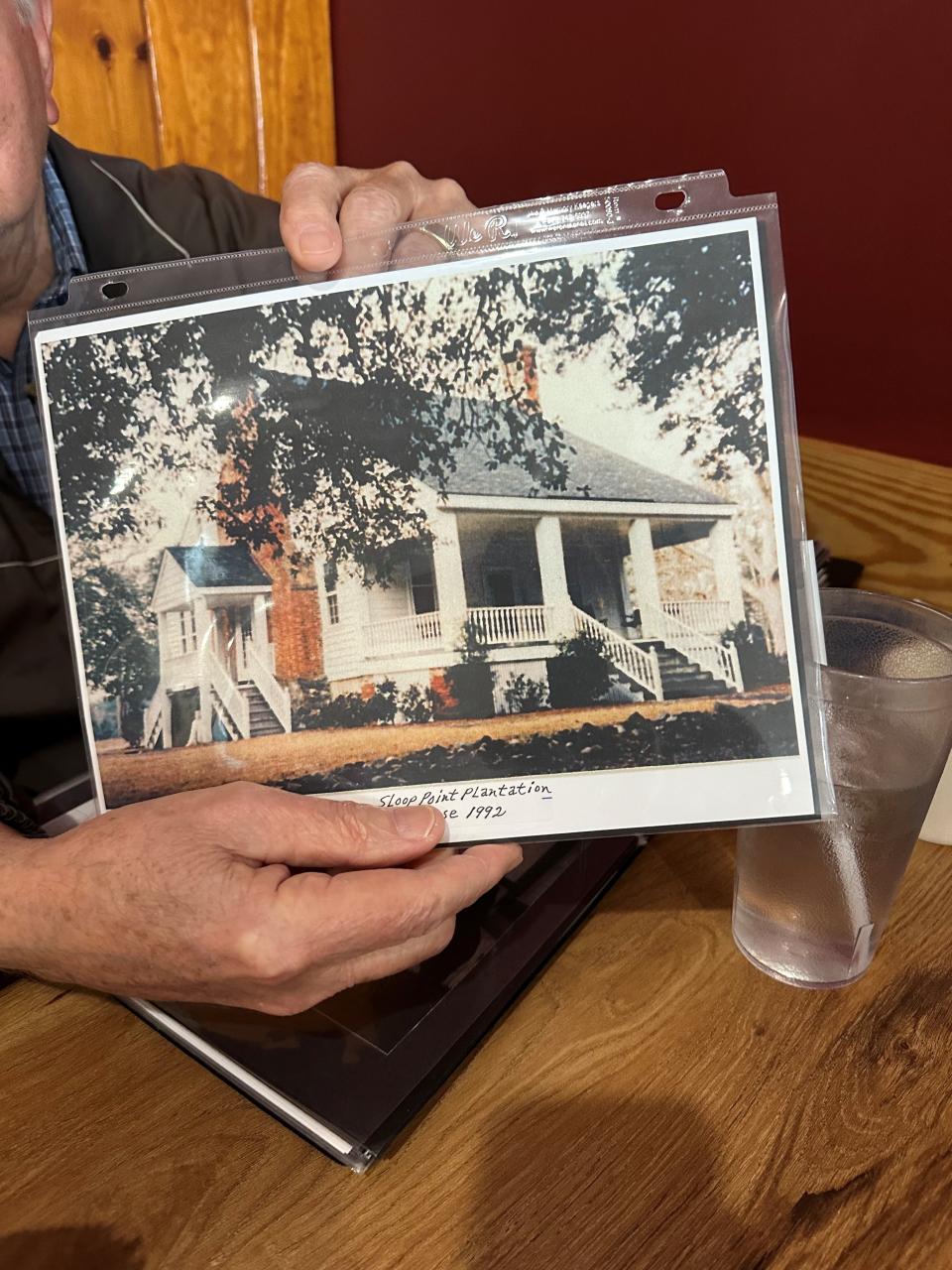How Sloop Point has transformed from a shipping port to a fast-growing residential area
Back when he was serving up chicken legs and any other items that locals needed in his father's country store, Steve Edens could not have imagined how much the Sloop Point area would grow.
Sloop Point, which is nestled between the fastest-growing areas in Pender County -- Surf City and Hampstead -- has a rich history. A notable part of that history is the fact that Sloop Point is one of North Carolina’s shortest-lived municipalities.
Since then, the Sloop Point community has seen a lot of change, including population growth and rising real estate prices. Nonetheless, some residents have dedicated years to preserving the area's rich history.
To be a town or not to be a town
Sloop Point was incorporated as a town on July 1, 1996, and disincorporated on July 22, 1998. The boundaries of the town went from Sloop Point Loop Road east to Alton D. Rivenbark Road, according to the StarNews archives.
At the time of incorporation, the community had around 30 to 35 residents.
In 1998, all but one of Sloop Point’s 21 registered voters asked for a repeal of the town charter and the North Carolina House of Representatives voted unanimously without discussion in favor of the repeal.
According to an article from The State, Sen. Patrick Ballantine of New Hanover, said, “they never got their act together,” when referring to Sloop Point. Ballantine said residents never decided who would manage the town, how they would run it and what the tax rate would be.
LEARN MORE: 5 things to know about Sloop Point in Pender County

Sloop Point Plantation
Long before Sloop Point's attempt at incorporation, it was home to multiple plantations. But only one still stands and it's considered the oldest house in North Carolina, according to NC Pedia.
According to the Library of Congress, Sloop Point Plantation was originally known as Ashe’s Neck and is located on Topsail Sound.
The plantation operated as an early saltworks, as salt was in high demand during the Civil War.
There is documentation that Ashe had enslaved people at the plantation, and according to NC Pedia, Ashe had enslaved 63 people by the time of the 1790 federal census.
Ashe’s heirs no longer own the plantation and the current owners who live in the house have made multiple renovations to the house and land.

Rosenwald school in Sloop Point
Sloop Point's Black community has deep roots in the area as it was home to Sloop Point Elementary School, which is one of the only Rosenwald schools left in North Carolina.
Over 5,300 Rosenwald schools were built in 15 Southern states with over 800 of them in North Carolina, more than any other state. Sloop Point Elementary School was one of 18 Rosenwald schools in Pender County and provided primary education for Black children in the community.
The school, along with Manhollow Missionary Baptist Church, is an important landmark that belongs to the historically Black Edgecomb Community.
More: As a fading Pender community fights for survival, a Hampstead leader lends her voice
According to "Griot: The Evolution of Edgecombe" by Curtis Hardison, who is a descendant of first-generation enslaved people in Pender County, the construction of the school was completed in 1921 and is one of eight remaining historic Rosenwald school buildings in the county.
"Practically every person that lives in the community today either attended or descended from the early attendees of the Sloop Point Elementary School," Hardison wrote. "They also comprise most of the current membership of the historic Manhollow Missionary Baptist Church that was constructed 52 years earlier in 1869."

Hardison said he attended the school from the first to fourth grades before attending Annandale Consolidated Elementary School.
Lilly Mae Billingsleigh, or as everyone called her Mibislay, Hardison said, was the teacher at Sloop Point during the time he was there and described her as a legend in the area because of all that she provided for the children.
"She did things that were so far ahead of everybody else," Hardison said."
Mibislay would contribute two cans of soup to the school once a week and would warm up a large porcelain pot during the winter months and use the soup to feed all of the children.
Hardison's next book, called "Griot: The Evolution of Edgecombe - A Rosenwald Year," is all about Mibislay and its planned release is in January in time for Black History Month.

From industrial to residential
Before Wilmington was even a port city, Sloop Point served as a place where colonial-era sloops came into the Sloop Point shipyard for repairs and ships came from England and unloaded many goods there, which left ballast stones that are still there today.
Lifelong Sloop Point resident Steve Edens, 72, said the ballast stones were also used in the making of early roads in eastern Pender County.
According to a December 1995 article by The State reporter Pam Whitfield, the sound of Topsail Island, where Sloop Point is located, lent itself to the shipyard business because it was a safer entrance than the Cape Fear River in early years.
Steve Edens said the big transition from industrial to residential happened when he was overseas serving in the Navy. He said his mother wrote him a letter telling him that the area was getting a golf course.
"I said 'a golf course?'" Steve Edens said. "That's when it started."
During the Camp Davis days, Steve Edens said some people were moving in and out of the area, but other than that nothing changed before 1970.
Then it was another golf course and then Castle Bay brought more houses in. Debbie Edens said that by about 1990 or 2000 it was booming.
Marion Andrews pointed out that a lot of people from up north were moving down to coastal North Carolina because they could get more bang for their buck.
Sloop Point families
Steve Edens, Debbie Edens and Marion Andrews have all spent years collecting history on the area, specifically Sloop Point.
Steve Edens said he remembers Eleanor MacMillan, who was one of the Sloop Point Plantation owners, coming into his dad's store.
"Once in a long while she would come in wearing those baggy beige pants but most often she would pull up and blow the car horn and wait for someone to come out and take her grocery order," Steve Edens said in one of the stories he shares on Facebook. "I kind of got the feeling that she still had an aire of superiority about her that may have passed down from the old plantation attitude."
Steve Edens said MacMillan would always ask for the shortest chicken leg because she believed that those had the most meat on them.

More: Real estate gems: Here are the most expensive homes sold in Pender County in 2023
Change has come
As it is nestled in between the most rapidly growing parts of Pender County, Sloop Point has seen heightened real estate prices and more people flooding into the area.
The median real estate price of Sloop Point is $408,318, which is more expensive than 72.9% of neighborhoods in North Carolina, according to Zillow.
Sloop Point’s real estate is also made up of many newer homes that were built in 2000 and even more recent. There are also several homes that were built between 1970 and 1999.
"They've got three elementary schools, they've got two middle schools and one high school and they're getting ready to build another elementary school," Debbie Edens said. "The schools can't keep up with the children. This is what's happening to the Sloop Point area."
Debbie Edens said she and Steve's daughter are substitute teachers on the eastern side of Pender County and that there isn't a day that goes by that she does not have to work.
Pender County Chairman Brad George has lived in Sloop Point for 34 years since he and his wife got married. He said he's seen a lot of growth since the mid '90s.
George said that when he and his wife first moved into the neighborhood they live in, there were four houses in total. Now, their neighborhood is fully developed.
"It's a great place to live, it used to be a lot quieter," said George, who's raised three kids there and plans to stay.
This article originally appeared on Wilmington StarNews: Pender County residents work to preserve the history of Sloop Point